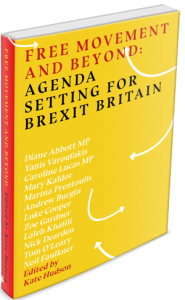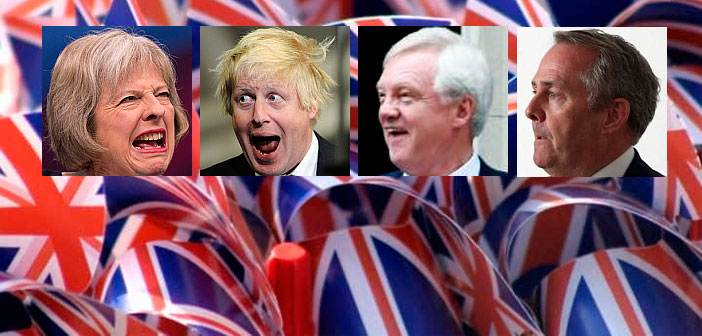Bliss was it to be alive: who will ever forget the glorious day when the UK finally threw off the yoke of the European Union?
Source: Infernal Machine
No matter what the future may bring, those of us who were lucky enough to be alive and British on March 29 2017 will never forget the glorious day when the United Kingdom finally threw off the yoke of the European Union. In the years to come, perhaps very soon, we will hold a national holiday to commemorate our liberation from four decades of unrelenting tyranny and near-total darkness, in which we had seen our precious nation brought to its knees by the dictatorship of Brussels.At last, our emissaries handed over the letter expressing the will of the people, and we were able to believe that it was really going to happen. It was the end of a nightmare or the beginning of a dream. Or the beginning of the beginning or the first birdsong heralding a new dawn or the birthpangs of a truly Global Britain. For some, it was only comparable to VE Day or the liberation of Paris. It was a moment that so many of us had dreamed of throughout the years of toil and suffering under the EU’s slippered jackboot.
Even Jacob Rees-Mogg was barely able to maintain the stiff upper lip and hold back the tears of joy as the first members of the EU occupying army began to pack their bags, taking their subsidies with them. Others smiled contentedly as the EU nurses left in the wake of the occupying forces, at the thought of the NHS that would soon be theirs. Cornwall and Wales let out a sigh of relief at the thought of all the European money that they would no longer receive. Ukip MEPs, hardened through decades of guerrilla warfare in the belly of the beast on salaries of only £84,000 a year plus expenses, came back from Eurostar with their sten guns and handgrenades, wondering how they would turn swords into ploughshares and forge new careers in a country where their single MP had just turned independent.
Watching the non-existent crowds in the empty streets, Michael Gove felt a lump in his throat at the thought that he would not be prime minister after all, but took consolation from the prospect of all those drugs that could now come onto the UK market without EU clinical trials, and the green spaces that could now be built over without all that EU red tape to prevent it. Boris Johnson shambled out into the street with his shirt hanging out over his trousers wondering how long he would have to wait before he could prime minister.
Others dreamed of bigger things. Oceans full of fish. Selling cows to New Zealand. Factories and coalmines reopening. Empty motorways and well-paid jobs for all. And above all, controlled borders and no foreigners, even though the government is now saying that immigration won’t go down after all.
The Sun, passed out like Father Jack in a corner of the nation’s living room, lifted its unshaven head and belched as it warned the Eurocratic scum that if they failed to reach a trade agreement the UK would stop sharing our ‘world-leading counter-terror and crime-fighting abilities’ with the EU. ‘Your money or your lives!’ the Sun croaked drunkenly, because we really are that great. And because in any trade negotiations, as the Sun reminded us before passing out again ‘ our crack team of politicians and civil servants’ will always vanquish the ‘Brussels no-hopers.’
Truly the white man had got his country back, and could look forward once again to taking the underground and not hearing Polish in a journey that would hopefully end up somewhere in the early 1950s. And the white woman could also rejoice, like the woman in Hastings who found historical parallels between our current slavery and the Norman Conquest, and concluded that ‘The concept of being governed by an unelected body would have been absolutely abhorrent to anyone in those days. It’s almost like the state has been lost. It was like another takeover, we relinquished our law and power to an unelected body.’
As any student of history knows, those Normans would never have allowed England to be taken over by an unelected body, so we could only put out the flags and cheer even louder that such great and noble thoughts had brought us to this pass. And the left could celebrate too, because as John McDonnell reminded us not long ago, ‘Brexit is an opportunity.’ Now the working class had spoken and delivered a fatal blow to ‘the elite’ and the neoliberal order and the British had the chance to get the socialism they had always secretly wanted – even if it was only socialism in one country.
Bliss was it to be alive, as Wordsworth once said about an equally historic moment, and it needed a poet to capture the beauty and the history of our own Liberation Day. Fortunately we had Theresa May, one of those rare politicians with a poetic license to make the impossible sound plausible and articulate the opposite of what is actually happening with absolute and total conviction.
Yesterday the vicar’s daughter reached new rhetorical heights as she reminded the nation that we are now going to ‘going to make our own decisions and our own laws’, regardless of the fact that we already do. She told us that the government that brought us foodbanks, fitness to work tests and the bedroom tax would ‘build a stronger, fairer Britain.’ Like so many others, she urged us to ‘ look forward with optimism and hope – and to believe in the enduring power of the British spirit.’
She told us ‘I choose to believe in Britain and that our best days lie ahead ‘ and we ‘chose’ to believe it too, even though there was absolutely nothing to suggest that any such future lay ahead. We did so because we had learned that fairies were real and because Brexiters warned us that they were tied of negativity, pessimism, and doubt, and some of them were even suggesting that those of us who harboured such thoughts might be traitors or criminals or collaborators with the EU death machine.
Our Great Leader also ‘chose’ to believe in ‘the British spirit’ and we did too, because the spirit can reach places where material processes fail, and she was ‘confident that we have the vision and the plan’ even though nothing that has happened since last June suggests that she has either. She promised us that we would become ‘a magnet for international talent and a home to the pioneers and innovators who will shape the world ahead’ – even though we already are exactly that.
Typically British in her magnanimity, she offered the olive branch to the European despots, and told them that she wanted to have ‘a new deep and special partnership between Britain and the European Union’ – as opposed to the old one which we already have.
She also promised ‘ a bold and ambitious free trade agreement with the European Union that allows for the freest possible trade in goods and services between Britain and the EU’s member states; that gives British companies the maximum freedom to trade with and operate within European markets; and that lets European businesses do the same in Britain’ – precisely the agreement that we already have.
She pledged to ‘ strengthen the Union of the four nations that comprise our United Kingdom’ even though Scotland and Ireland are already pulling away and Wales is unlikely to be far behind. She assured the workers amongst us that ‘workers’ rights are fully protected and maintained’ even though the British standard of living ranks at number ten out of 18 European countries and the Institute for Fiscal Studies predicts that most British workers will be earning no more in 2021 than they were in 2008.
Last but not least, she reminded parliament ‘ at moments like these – great turning points in our national story – the choices we make define the character of our nation.’
She was right about that too.
Free Movement and Beyond – Agenda Setting for Brexit Britain
 This new book featuring Diane Abbott MP, Yanis Varoufakis, Caroline Lucas MP, Professor Mary Kaldor and more, is available now from Public Reading Rooms. It draws together the current thinking of many of Britain’s most prominent ‘critical Remainers’ – those who argued to remain within the European Union while seeking its democratic and progressive transformation.
This new book featuring Diane Abbott MP, Yanis Varoufakis, Caroline Lucas MP, Professor Mary Kaldor and more, is available now from Public Reading Rooms. It draws together the current thinking of many of Britain’s most prominent ‘critical Remainers’ – those who argued to remain within the European Union while seeking its democratic and progressive transformation.

